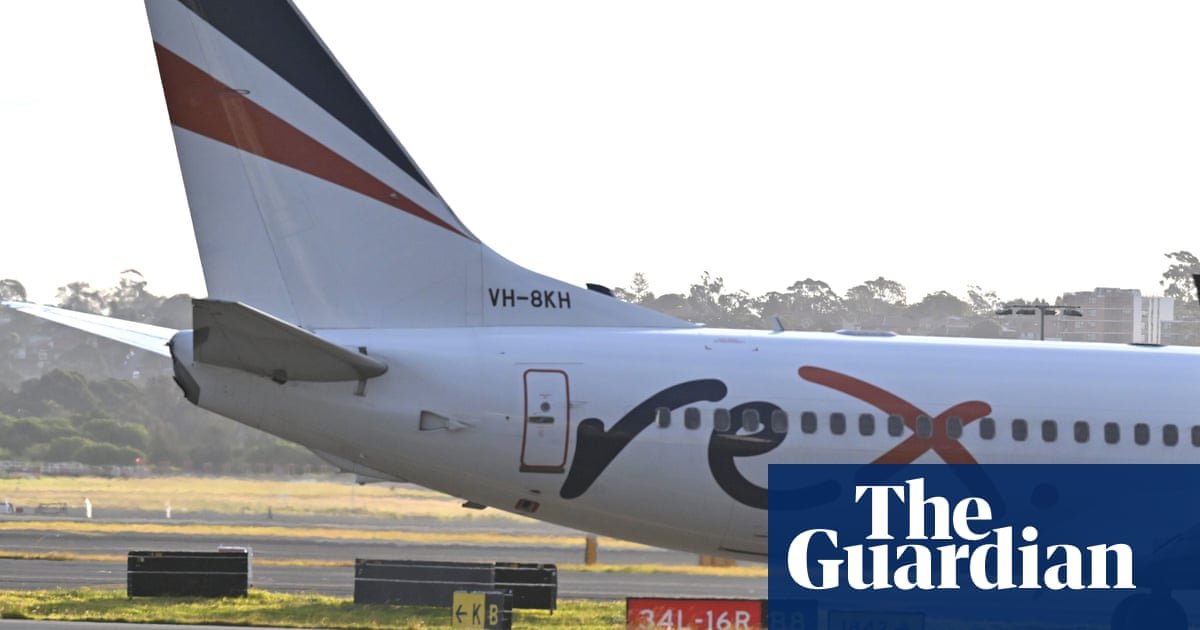The administrators called in to run Rex have told workers that 610 jobs at the airline will be axed, according to a key aviation union.
Also on Wednesday, there was speculation that Asia-based private equity firm PAG, which funded Rex’s $150m expansion to jet operations, was considering becoming the airline’s new owner out of administration.
Hours after the administrators from Ernst & Young announced that all Rex Boeing 737 flights between capital cities were grounded, employees at the nation’s third-largest airline have also been told those flights will cease to operate, according to the Transport Workers Union (TWU).
Employees were told that winding up Rex’s jet operations between cities such as Sydney, Melbourne and Brisbane would result in 360 redundancies, the TWU said.
A further 250 job losses would come from elsewhere in the business, which employed about 2,000 people before entering administration, the union said.
The TWU national secretary, Michael Kaine, called it “another dark day for aviation, with over 600 families faced with sudden joblessness in an industry that has taken hit after hit”.
Kaine said the union had been working to secure job opportunities at other airlines and aviation companies for ground crew, cabin crew and pilots and “had positive conversations with Virgin Australia and ground handler Dnata”.
Guardian Australia approached the administrators for confirmation.
Fallout from the turmoil at Rex continued on Wednesday morning, with politicians around the country pleading with the Albanese government to ensure the airline’s key regional routes operated by its fleet of 36-seater Saab 340 turboprop aircraft – which the administrator has so far insisted will continue to operate – do not close.
Virgin Australia offered some Rex customers rebooking on their own flights, free of charge. Qantas and Jetstar have since echoed these offers. All three airlines have also discussed taking on axed Rex staff.
Virgin is also understood to be taking over the leases of three Rex 737 jets, and has said it will also explore selling tickets to Rex’s regional services through codeshare agreements.
The government has indicated it will ensure the airline’s regional operations continues to exist in some capacity. The government has hinted it could look to take a stake in the airline, something the TWU and the Greens have called for.
Transport minister Catherine King said her department had been in discussions with the administrators about supporting Rex overnight and into Wednesday.
“Rex is an important airline for regional and remote communities and Rex’s continuation is in the best interests of regional Australians, the travelling public, its workers and the aviation sector,” King said.
Samuel Freeman, one of the administrators appointed, said the grounding of Rex’s jet operations was a “permanent decision”, and that he was hopeful of finding a buyer for the what would be a restructured airline returning to its legacy form of just regional routes.
Freeman said administrators would examine a range of issues, including Rex’s leadership – where boardroom tensions intensified in the lead up to entering administration – as well as problems with its ageing Saab 340 fleet, pilot shortages, and load factors on its jet operations between major cities.
after newsletter promotion
Bridget McKenzie, the opposition transport spokesperson, criticised Labor for failing to implement reforms that smaller airlines such as the now defunct Bonza, Rex and competition advocates had called for, including changes to the legislation that governs access to Sydney airport, after allegations Qantas and Virgin were deliberately blocking new entrants from launching rival services at peak times.
McKenzie also hit back against suggestions from the prime minister, Anthony Albanese, that Rex’s issues stemmed from its expansion into offering jet services on the lucrative “golden triangle” between Sydney-Melbourne-Brisbane and its push to compete with Qantas and Virgin since 2020.
“When Rex launched into those routes to compete against Qantas, Virgin was grounded, prices were sky high, and service was appalling. They raised private equity of around $150m to enter that market and provided much-needed competition for Qantas,” McKenzie told ABC Radio National.
“Now you’ve got the prime minister saying, ‘Well, Rex, this is what happens when you go up against the behemoth and my best mate Qantas’,” she said. “There is a problem with competition in this country.”
McKenzie said the fact Bonza had also recently collapsed suggested broader issues.
“Two airlines in just four months have been beaten into submission under Anthony Albanese,” McKenzie said.
Sydney airport’s leadership, a longtime critic of the federal legislation governing access to its slots, expressed its disappointment at Rex entering voluntary administration.
“What this situation demonstrates is that we need to change some things in the Australian aviation market for competition to thrive, because recent history suggests the barriers are too high,” Sydney airport’s CEO, Scott Charlton, said on Wednesday.
A government-ordered review into Sydney airport’s slot access delivered recommendations for competition reforms that Labor has indicated it will address in its upcoming aviation white paper, due imminently.
Meanwhile, the premiers of Victoria, South Australia, New South Wales and Queensland spoke about the need for government intervention to ensure Rex’s regional services continue in operating as a link between rural communities and cities, including for health services.
